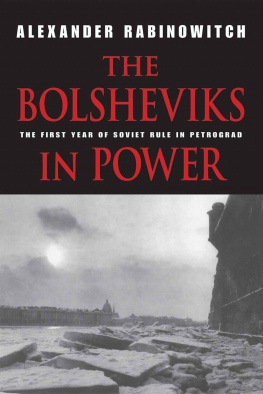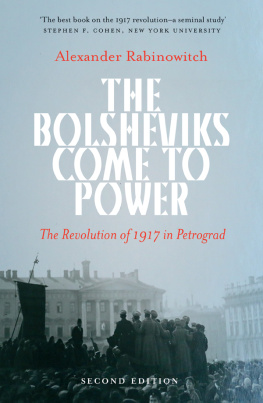THE
BOLSHEVIKS
IN POWER
THE
BOLSHEVIKS
IN POWER
THE FIRST YEAR OF
SOVIET RULE IN PETROGRAD

ALEXANDER RABINOWITCH
INDIANA UNIVERSITY PRESS
Bloomington and Indianapolis
This book is a publication of
Indiana University Press
601 North Morton Street
Bloomington, IN 47404-3797 USA
http://iupress.indiana.edu
Telephone orders800-842-6796
Fax orders812-855-7931
Orders by e-mail
2007 by Alexander Rabinowitch
All rights reserved
No part of this book may be reproduced or utilized in any form or by any means, electronic or mechanical, including photocopying and recording, or by any information storage and retrieval system, without permission in writing from the publisher. The Association of American University Presses Resolution on Permissions constitutes the only exception to this prohibition.
The paper used in this publication meets the minimum requirements of American National Standard for Information SciencesPermanence of Paper for Printed Library Materials, ANSI Z39.48-1984.
Manufactured in the United States of America
Library of Congress Cataloging-in-Publication Data
Rabinowitch, Alexander.
The Bolsheviks in power : the first year of Soviet rule in Petrograd / Alexander Rabinowitch.
p. cm.
Includes bibliographical references and index.
ISBN 978-0-253-34943-9 (cloth : alk. paper) 1. Rossiiskaia sotsial-demokraticheskaia rabochaia partiia (bolshevikov)HistorySources. 2. Saint Petersburg (Russia)HistoryRevolution, 19171921Sources. 3. Soviet UnionHistoryRevolution, 19171921.
4. Kommunisticheskaia partiia Sovetskogo SoiuzaHistorySources.
5. Lenin, Vladimir Ilich, 18701924. I. Title.
JN6598.S6R33 2007
947.210841dc22
2007007276
1 2 3 4 5 12 11 10 09 08 07
For Victor
Twin brother, best friend, global humanitarian
CONTENTS
PREFACE AND ACKNOWLEDGMENTS
THE BOLSHEVIKS came to power in Russia in October 1917. The regime they established, which was dedicated to the universal triumph of communism, controlled Russian politics and society for more than seventy-five years. It can reasonably be argued that this outcome, more than any other single event, shaped world history for much of the twentieth century.
Most of my professional research and writing has been devoted to studying the October 1917 revolution and its immediate outcome in Petrograd, now St. Petersburg, the capital of Imperial and revolutionary Russia. In my first book, Prelude to Revolution: The Petrograd Bolsheviks and the July Uprising (Indiana University Press, 1968), I explored the causes, development, and results of the abortive July 1917 insurrection in Petrograd as a means of clarifying the sources of popular dissatisfaction with the liberal/moderate-socialist Provisional Government, and the program, structure, method of operation, and strengths and weaknesses of the Bolshevik party (in comparison with other contemporary political parties). In my next book, The Bolsheviks Come to Power (1976), I utilized the insights provided by Prelude to Revolution to better understand the nature of the October 1917 Russian revolution, the reasons for the failure of Western-style democracy, and the triumph of Lenin and the Bolsheviks. Most fundamental, my goal in both books was to study events in Petrograd as a means of addressing basic, then inadequately studied, questions relating to the Bolsheviks and the course of the October revolution.
The Bolsheviks Come to Power, together with Prelude to Revolution, challenged prevailing Western notions of the October revolution as no more than a military coup by a small, united band of revolutionary fanatics brilliantly led by Lenin. I found that, in 1917, the Bolshevik party in Petrograd transformed itself into a mass political party and that, rather than being a monolithic movement marching in lock step behind Lenin, its leadership was divided into left, centrist, and moderate right wings, each of which helped shape revolutionary strategy and tactics. I also found that the partys success in the struggle for power after the overthrow of the tsar in February 1917 was due, in critically important ways, to its organizational flexibility, openness, and responsiveness to popular aspirations, as well as to its extensive, carefully nurtured connections to factory workers, soldiers of the Petrograd garrison, and Baltic Fleet sailors. The October revolution in Petrograd, I concluded, was less a military operation than a gradual process rooted in popular political culture, widespread disenchantment with the results of the February revolution, and, in that context, the magnetic attraction of the Bolsheviks promises of immediate peace, bread, land for the peasantry, and grass-roots democracy exercised through multiparty soviets.
This interpretation, however, raised as many questions as it answered. For if the success of the Bolshevik party in 1917 was at least partly attributable to its open, relatively democratic, and decentralized character and operational style, as seemed clear, how was one to explain the fact that it was so quickly transformed into one of the most highly centralized, authoritarian, political organizations in modern history? Further, if soviets, in 1917, were genuinely democratic, embryonic organizations of popular self-rule, as my studies also suggested, how was it that the independence of soviets and other mass organizations was destroyed so quickly? Most fundamental, perhaps, if the goal of many of the dissatisfied lower-class citizens of Petrograd who spearheaded the subversion of the Provisional Government and facilitated the Bolshevik seizure of power was the creation of an egalitarian society and a democratic-socialist, multiparty political system, and if this goal was shared by many prominent Bolsheviks, as my research also showed, how was one to explain the extraordinary rapidity with which these ideals were subverted and Bolshevik authoritarianism became firmly entrenched?
These are the key questions posed in this book. My efforts to complete it have taken an inordinately long time, ironically partly because of the cultural liberalization begun by Mikhail Gorbachev. I had completed pertinent research during trips to Leningrad and Moscow libraries by the early 1980s. Well before Gorbachev and the collapse of the Soviet Union in 1991, I had begun drafting the main chapters. I was dissatisfied with the results, however, especially for the period after much of the non-Bolshevik press was shut down during the first half of 1918, which eliminated one of my main sources. Even the limited kinds of published documents on events, institutions, social groups, and political figures and parties, especially the Bolshevik party organization in Petrograd, that were crucial for my work on 1917 were unavailable for 1918. Thus, to complete this book, I needed access to Soviet government and Communist party archives, which were then still tightly sealed.
The first strong hint of the immense change that liberalization under Gorbachev would have on my situation as a Western historian of the Russian revolution and earliest Soviet period came in 1989, when The Bolsheviks Come to Power became the first Western study of the revolution published in the Soviet Union. I remember the presentation of the book in an auditorium at the Progress Publishing House in Moscow as one of the most satisfying in my life. All the same, even after the books publication in the Soviet Union, the possibility that a bourgeois falsifier like me might soon have the opportunity to work in Soviet historical archives still seemed farfetched.
Next page










